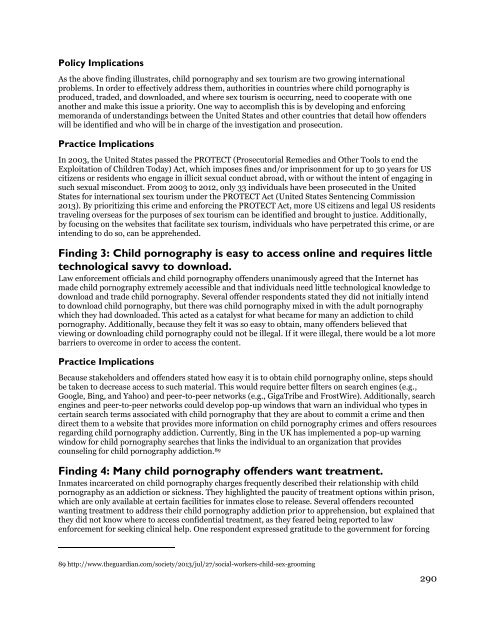413047-Underground-Commercial-Sex-Economy
413047-Underground-Commercial-Sex-Economy
413047-Underground-Commercial-Sex-Economy
Create successful ePaper yourself
Turn your PDF publications into a flip-book with our unique Google optimized e-Paper software.
Policy Implications<br />
As the above finding illustrates, child pornography and sex tourism are two growing international<br />
problems. In order to effectively address them, authorities in countries where child pornography is<br />
produced, traded, and downloaded, and where sex tourism is occurring, need to cooperate with one<br />
another and make this issue a priority. One way to accomplish this is by developing and enforcing<br />
memoranda of understandings between the United States and other countries that detail how offenders<br />
will be identified and who will be in charge of the investigation and prosecution.<br />
Practice Implications<br />
In 2003, the United States passed the PROTECT (Prosecutorial Remedies and Other Tools to end the<br />
Exploitation of Children Today) Act, which imposes fines and/or imprisonment for up to 30 years for US<br />
citizens or residents who engage in illicit sexual conduct abroad, with or without the intent of engaging in<br />
such sexual misconduct. From 2003 to 2012, only 33 individuals have been prosecuted in the United<br />
States for international sex tourism under the PROTECT Act (United States Sentencing Commission<br />
2013). By prioritizing this crime and enforcing the PROTECT Act, more US citizens and legal US residents<br />
traveling overseas for the purposes of sex tourism can be identified and brought to justice. Additionally,<br />
by focusing on the websites that facilitate sex tourism, individuals who have perpetrated this crime, or are<br />
intending to do so, can be apprehended.<br />
Finding 3: Child pornography is easy to access online and requires little<br />
technological savvy to download.<br />
Law enforcement officials and child pornography offenders unanimously agreed that the Internet has<br />
made child pornography extremely accessible and that individuals need little technological knowledge to<br />
download and trade child pornography. Several offender respondents stated they did not initially intend<br />
to download child pornography, but there was child pornography mixed in with the adult pornography<br />
which they had downloaded. This acted as a catalyst for what became for many an addiction to child<br />
pornography. Additionally, because they felt it was so easy to obtain, many offenders believed that<br />
viewing or downloading child pornography could not be illegal. If it were illegal, there would be a lot more<br />
barriers to overcome in order to access the content.<br />
Practice Implications<br />
Because stakeholders and offenders stated how easy it is to obtain child pornography online, steps should<br />
be taken to decrease access to such material. This would require better filters on search engines (e.g.,<br />
Google, Bing, and Yahoo) and peer-to-peer networks (e.g., GigaTribe and FrostWire). Additionally, search<br />
engines and peer-to-peer networks could develop pop-up windows that warn an individual who types in<br />
certain search terms associated with child pornography that they are about to commit a crime and then<br />
direct them to a website that provides more information on child pornography crimes and offers resources<br />
regarding child pornography addiction. Currently, Bing in the UK has implemented a pop-up warning<br />
window for child pornography searches that links the individual to an organization that provides<br />
counseling for child pornography addiction. 89<br />
Finding 4: Many child pornography offenders want treatment.<br />
Inmates incarcerated on child pornography charges frequently described their relationship with child<br />
pornography as an addiction or sickness. They highlighted the paucity of treatment options within prison,<br />
which are only available at certain facilities for inmates close to release. Several offenders recounted<br />
wanting treatment to address their child pornography addiction prior to apprehension, but explained that<br />
they did not know where to access confidential treatment, as they feared being reported to law<br />
enforcement for seeking clinical help. One respondent expressed gratitude to the government for forcing<br />
89 http://www.theguardian.com/society/2013/jul/27/social-workers-child-sex-grooming<br />
290


